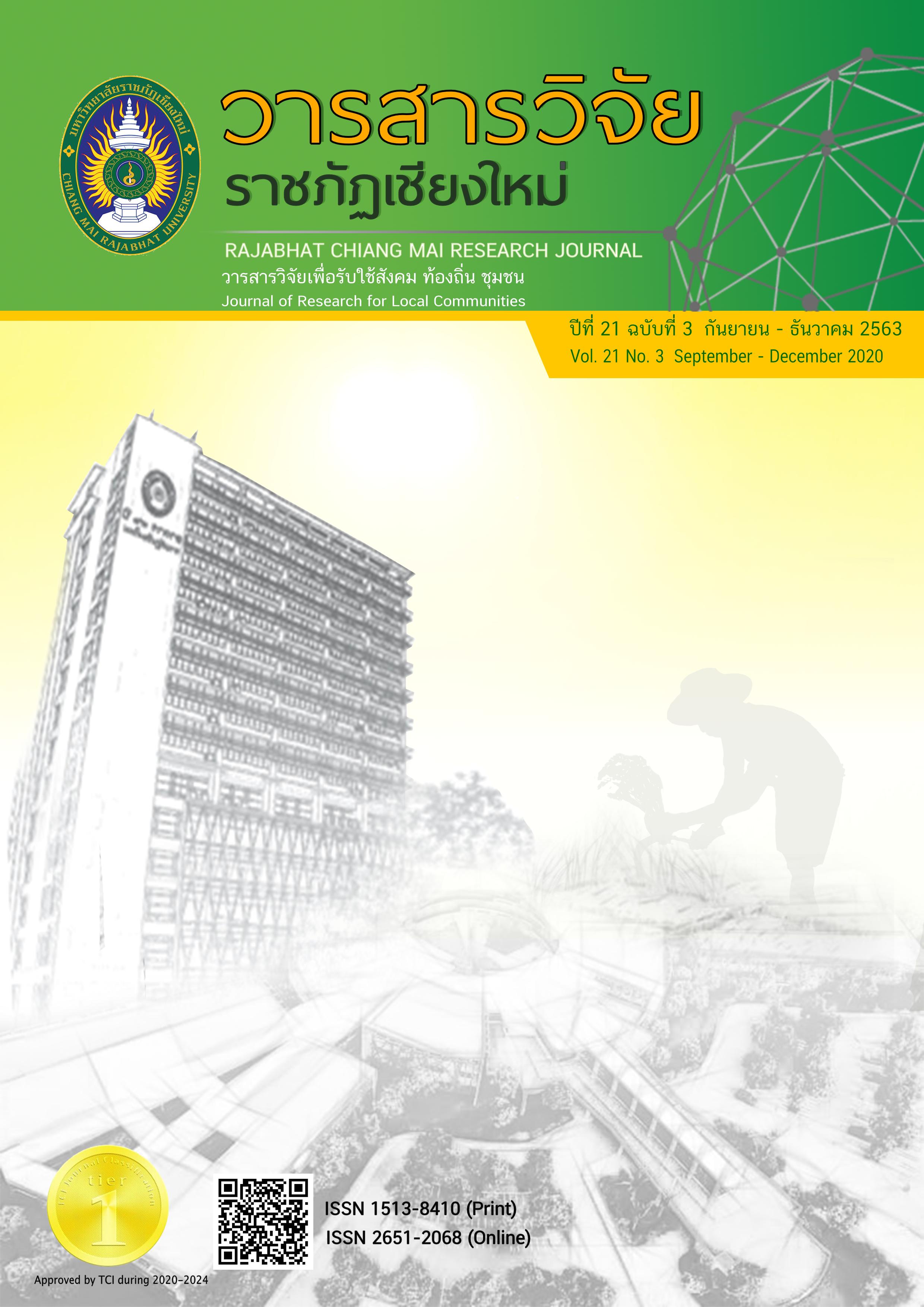Effects of Using POGIL on the Science Concepts and Collaborative Skills of Grade 4 Students
DOI:
https://doi.org/10.14456/rcmrj.2020.241561Keywords:
POGIL, Science concepts, Collaborative skillsAbstract
The objectives of this research were 1) to compare of scientific concepts of students during the pretest and posttest, by using the POGIL learning process, and 2) to study the cooperative skills of students during their studies using the POGIL learning process. The population was 20 students in grade 4, during the second semester in the academic year of 2019 at Ban Napoon School, Wang Chin District, Phrae Province.The instruments used to collect data were 9 learning management plans using the POGIL learning process, conceptual science test, and observation form for cooperative skills. Quantitative data were analyzed by means, percentages, gain scores, and standard deviation. The results were as follows: 1) Scientific concepts of students after study were higher than prior to learning with gain score at 62.47 %. The learning development was at a high level. And 2) Collaborative skills of students during study by using the learning POGIL has an excellent level at 93.58 %.
Downloads
References
Chairiah, Y., Purwoko, A., & Hadisaputra, S. (2018). Development Of Learning Based POGIL (Process Oriented Guided Inquiry Learning) Concept Control In Improving Student Senior High School 8 Mataram Acid Base Materials. IOSR Journal of Research & Method in Education (IOSR-JRME), 8(3), 4-6.
Dechakup, S. & Yindsuk, P. (2016). Learning management in the 21st century. (4th ed.). Bangkok: Chulalongkorn University. (In Thai)
Dechakup, S. & Yindsuk, P. (2017). Teacher 7C Skills 4.0. (3rd ed.). Bangkok: Chulalongkorn University. (In Thai)
Hanson, D.M. (2006). Instructor’s guide to process-oriented guided-inquiry learning. Lisle, IL: Pacific Crest.
Irwanto, Saputro, A. D., Rohaeti, E., & Prodjosantoso, A. K. (2018). Promoting Critical Thinking and Problem Solving Skills of Preservice Elementary Teachers through Process-Oriented Guided-Inquiry Learning (POGIL). International Journal of Instruction, 11(4), 777-794.
Kanjanawat, S. (2014). Traditional testing theory. (7th ed). Bangkok: Chulalongkorn University. (In Thai)
Ministry of Education. (2014). Guidelines for measuring and assessing learning outcomes according to the Basic Education Core Curriculum 2008. Bangkok: Agricultural Assembly of Thailand. (In Thai)
Nuengchaloem, P. (2015). Science learning in the 21st century. Bangkok: Chulalongkorn University. (In Thai)
Opara, M.F. (2014). Improving Students Performance in Stoichiometry through the Implementation of Collaborative Learning. Journal of Education and Vocational Research, 5(3), 85-93.
Pootadto, K. (2016). Effects of Using Process Oriented Guided-Inquiry learning (Pogil) on Chemistry Concepts and Analyzing Ability of Upper Secondary School Students. An Online Journal of Education (OJED), 11(1), 266-281. (In Thai)
Potgieter, M. (2015). Exploring the effectiveness of POGIL and Chemorganisers in foundation chemistry. Hatfield: University of Pretoria.
Susuorat, P. (2008). Development of thinking. Bangkok: 9119 Printing Techniques. (In Thai)
Downloads
Published
How to Cite
Issue
Section
License
1. Articles, information, content, images, etc published in the “Community and Social Development Journal” are copyrighted by the Community and Social Development Journal, Chiang Mai Rajabhat University. In order to properly distribute the articles through print and electronic media, the authors still hold the copyright for the published articles under the Creative Commons Attribution (CC BY) license, which allows the re-distribution of the articles in other sources. References must be made to the articles in the journal. The authors are responsible for requesting permission to reproduce copyrighted content from other sources.
2. The content of the articles appearing in the journal is the direct responsibility of the article authors. The editorial board of the journal does not necessarily agree with or share any responsibility.














